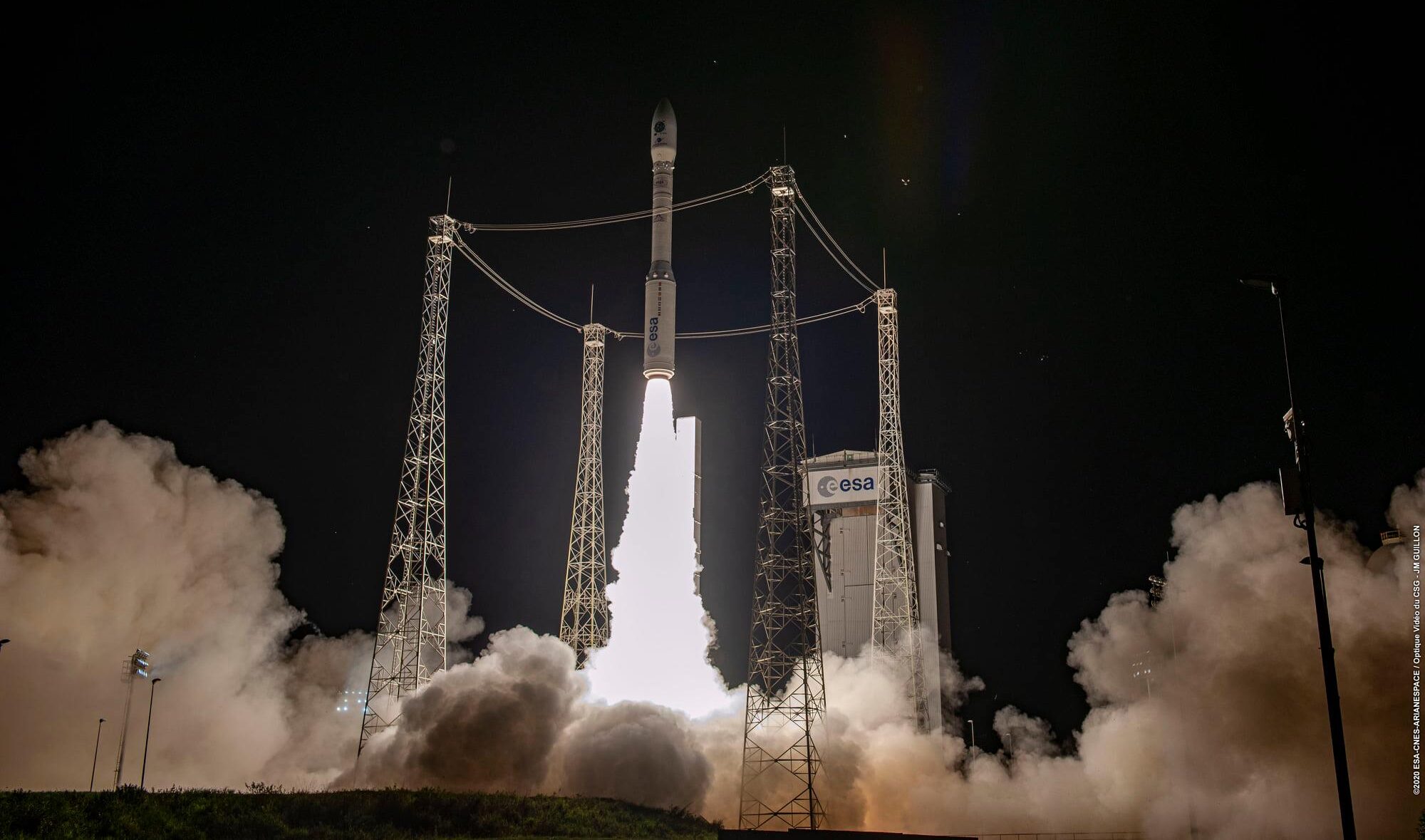Successful Launch of Ground-breaking AI-enabled Earth Observation Satellite

PhiSat-1 is part of an ambitious and ground-breaking programme funded by the European Space Agency (ESA) and supported by Enterprise Ireland, in which state-of-the-art Deep Learning technology for the in-orbit processing of Earth Observation data is being deployed on a European satellite for the first time.
The Ubotica CVAITM Artificial Intelligence (AI) technology, which is based on the Irish-designed Intel Movidius Myriad 2 Vision Processing Unit, will enable decisions to be made on-board PhiSat-1 rather than on the ground, resulting in faster, more efficient applications being deployed on the satellite. The AI task being demonstrated on PhiSat-1 is that of automatic cloud detection on images captured by the satellite’s advanced hyperspectral sensor.
This is the first of a number of programmes in which Ubotica is working with leading players in the European Space sector to enable the development and deployment of highly performant Artificial Intelligence applications in Space, in a time and cost-efficient manner, using Commercial Off The Shelf (COTS) components.
Speaking after the successful launch, Aubrey Dunne, Co-Founder and Vice President (VP) of Engineering at Ubotica Technologies said “We are very excited to be a key part of the PhiSat-1 mission by enabling the demonstration of AI in an autonomous CubeSat application, in conjunction with ESA and our European partners. This mission is the culmination of two years of effort by Ubotica, in collaboration with ESA, to characterise and prepare the Myriad 2 device for deployment in Space. Myriad’s low-power, high-performance compute is ideally suited to satellite applications, and Ubotica’s AI technology harnesses this compute to effectively address the opportunities that we are
seeing emerge in the ‘New Space’ paradigm”.
Speaking about the launch of PhiSat-1, Damien English TD, Minister of State for Business, Employment and Retail, said “The key role of Ubotica Technologies in Europe’s first smart satellite, which will allow for decision making and processing on board, is yet another example of the extraordinary and impressive capabilities of Irish high-tech start-up companies. This significant achievement, supported by national RD&I programmes in addition to Ireland’s membership of the European Space Agency and the EU Space programmes, will enable Ireland to realise the vision of the National Space Strategy for Enterprise alongside the aims of Future Jobs Ireland, particularly the enhancement of skills in areas including AI and Machine Learning (ML). Additionally, and importantly, the contribution of Ubotica Technologies to the PhiSat-1 mission will further equip Europe and Ireland to more effectively address climate disruption, an issue which is requiring an increasingly urgent response”.
Tom Kelly, Enterprise Ireland Divisional Manger, Innovation and Competitiveness, said “Enterprise Ireland is delighted to be part of this European success story. The technology originally developed by Movidius, with support from Enterprise Ireland, has been brought to Space by Ubotica, one of our exciting new high-tech start-up companies. This a truly ground-breaking application – a European first – that will have a profound impact on Earth Observation and contribute to informing our response to climate change.”
Josef Aschbacher, Director of Earth Observation Programmes, European Space Agency said “The Myriad 2 chip, which was developed with Irish expertise at Movidius (subsequently bought by Intel) and brought to Space by Ubotica, an AI start-up, is a prime example of Ireland’s innovation power in Space. The AI chip is the core element of the PhiSat-1 experiment and is the first AI chip on a European Earth observation satellite. PhiSat-1 will allow ESA to explore the power of AI in Space. I expect huge potential from this technology for future Earth observation satellites, which would reduce costs while at the same time increasing performance”.
Gianluca Furano, ESA Data Systems and On-Board Computing Lead, European Space Agency said “The spin in of AI/ML technology in Space applications will eventually lead to a breakthrough in on-board data processing capabilities thus allowing new, exciting applications in all fields (remote sensing, exploration, opportunistic science). It will for example allow concentration of the data acquired over multiple sensors reducing the required number of electronic units, saving mass, power, volume and reducing harness complexity. Technology is by no way restricted to one domain, as it is applicable to both platform and payload sides allowing to provide, except for its main purpose, useful by-products. What we have done with PhiSat-1 is a world’s first, that will show industries and institutions that ‘edge AI in Space’ is now, not in a decade’s time.”
ENDS
Notes to Editors
About Ubotica Technologies
Ubotica Technologies, founded in 2016, develops and deploys Artificial Intelligence solutions for industrial and commercial edge computing applications using the Myriad family of Vision Processing Units. In addition to custom Neural Network development, the company specialises in combining Artificial Intelligence with Computer Vision pipelines in hardware-targeted applications. Ubotica employs 15 people across its Dublin (HQ) and Spanish offices, and is actively engaged in the Space, IoT, and Industry 4.0 segments.
Ubotica’s CVAI ToolkitTM
The Ubotica CVAI ToolkitTM exposes the range of efficient Computer Vision (CV) and Artificial Intelligence (AI) capabilities of the Myriad family of devices to end users via a succinct API and a Myriad firmware image, enabling host-side user design and control of embedded CV and Image Signal Processing (ISP) pipelines that seamlessly integrate with Neural Network (NN) inference. By unleashing the processing power of Myriad through the API and firmware, the toolkit facilitates rapid application development and Myriad integration without requiring any embedded programming or direct control of the underlying hardware, saving learning effort and eliminating the need to access
the full device toolchain. The Toolkit’s browser-based drag-and-drop interface for developing CV/ISP pipelines provides the ability to pre-process images prior to completely customisable NN inference.
About the European Space Agency
The European Space Agency (ESA) is Europe’s gateway to Space. ESA is an intergovernmental organisation, created in 1975, with the mission to shape the development of Europe’s space capability and ensure that investment in Space delivers benefits to the citizens of Europe and the world. ESA develops the launchers, spacecraft and ground facilities needed to keep Europe at the forefront of global Space activities. Today it launches satellites for Earth observation, navigation, telecommunications and astronomy, sends probes to the far reaches of the Solar System and cooperates in the human exploration of Space.
The purpose of Ireland’s membership of ESA is to participate in European Space programmes with a focus on facilitating innovative Irish operations to develop leading-edge Space technologies and to commercially exploit their ESA participation in global Space and non-Space markets, leading to increased export sales and employment. Irish membership of ESA is funded through an annual subscription that allows Irish companies and researchers to competitively bid for ESA tenders. The value of the resulting contracts is commensurate with Ireland’s contribution to the overall ESA budget. Enterprise Ireland co-ordinates Ireland’s industrial and research participation in the programmes of ESA in collaboration with the Department of Business, Enterprise and Innovation.
